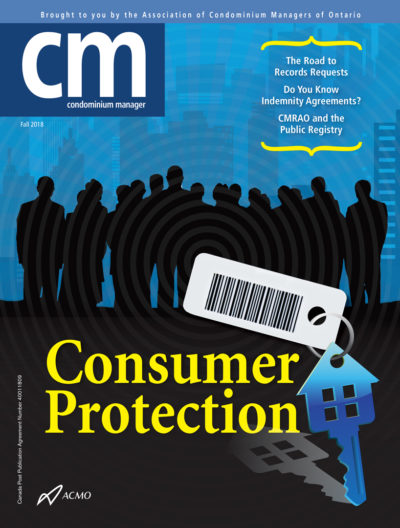
From the Fall 2018 Issue
Are Managers Being Penalized
by Resident Retaliation?
Are condominium managers being penalized by resident retaliation? This may sound absurd, but it is a reality that managers may face on a daily basis. Huh? Daily basis… Sometimes managers think that “pain” is part of the job description. Really? It should not be.
The manager’s contractual duty is to uphold compliance of the declaration, rules and regulations of the specific corporation and to enforce it as prescribed under the Condominium Act, 1998. The collection of Common Element Fees (CEF) is part of a manager’s duties and essential for the operation of the corporation. That being said, the manager must enforce the rules on any delinquent owner/resident.
When a delinquent owner / resident complains or accuses the manager of wrongdoing, often the approach by the board of directors is to accommodate the complainant who has made the alleged accusation. While it seems like a proper way to address the issue, in many cases the matter can become out of focus, and often results with questioning or second guessing the manager. Maybe he or she could do this or that, or maybe there’s a better approach.
Yes! It can be better. And yes! the manager can make a mistake and also yes! maybe another approach is better. The problem is most people, including directors, often jump to a conclusion not considering the state of mind, timing and action taken by a manager at THAT moment to avoid further conflict. It is easy to judge after the fact, but don’t.
In courts of law we hear about motive, intent and opportunity. What is the motive? What is the intent and why instigate actions to retaliate or harbour a personal vendetta against the manager? It is the statutory duty of the board to understand motive(s) behind CEF complaints, and whether the resident/ owner is fulfilling his most basic obligation to pay condominium fees or NOT. The Act makes an important reference at any Annual General Meeting: if a resident is in default of paying his condominium fees, while he can attend the meeting, he does not have a right to vote on any matters at the meeting. That means the resident /owner lost the right to voice his or her individual preference.
We, as property managers, should not be penalized and harassed by any individual resident/owner for following the procedures as required for building operations, such as chasing arrears and imposing the issuance Notice of Liens known as Form 14 or any other compliance actions.
Videotaping, Consent and Safety
Nowadays, videotaping/filming is everywhere; but remember, videotaping requires consent of all parties to the conversation. Without consent, situations where recording and disclosing participant communications can give rise to civil suits by the “injured” party, as well as criminal prosecution. Consent must be given before recording any conversation. When the manager is recorded and clearly has not consented, the secret recording is an intrusion, particularly if deception is used with malicious intent. In this case, the resident’s action is offensive and can be considered harassment, trespassing or otherwise intrusion. These acts are not only personally offensive, but also question the manager’s professionalism.
Apart from the fact that this conduct causes a dangerous situation on the common elements contrary to Section 117 of the Condominium Act, 1998, the resident compromises the safety of the workplace contrary to theOccupational Health and Safety Code.
The condominium premises constitute a workplace for the purposes of the Occupational Health and Safety Code. Pursuant to that legislation, and specifically the regulations pertaining to Workplace Violence and Harassment, the condominium corporation has a duty to ensure the safety and security of the workplace for all workers, and to ensure that the workplace is free from any type of violence or harassment at all times including workplace retaliation.
Any conduct by an individual that compromises the safety or security of the workplace, the safety, security or well-being of any worker, or otherwise interferes with the condominium corporation’s statutory duties to maintain a compliant workplace environment or its statutory duties as an occupier of the common elements, will not be tolerated under any circumstances.
The corporation’s solicitors must prohibit behaviour that results in incidents that create a dangerous condition on the common elements, that compromises the safety of the workplace, or that compromises the safety or well-being of any worker. The resident should be held personally responsible for all legal and other costs incurred in connection with any proceeding that the condominium initiates to restrain the resident’s conduct. The resident will also be held personally responsible for any and all third-party liabilities, costs, damages, claims or penalties that may be incurred.
Simply, the corporation as an occupier of the common elements has statutory duties to maintain a compliant workplace environment and such specific action requires the board to instruct the corporation’s solicitors to restrain this conduct and to set precedent that this act will not be tolerated under any circumstances. By not taking any action, the corporation indirectly condones workplace retaliation and penalizes the manager’s professionalism.
Justin K Erfin, RCM, ACoM, LEED GA, CPM® holds his CMRAO – General License with over 15 years’ experience in the industry providing high levels of service and care at condominium, residential, retail, and commercial buildings.



